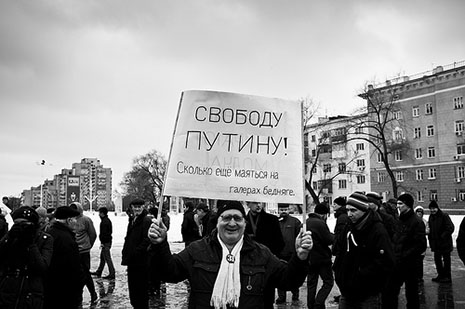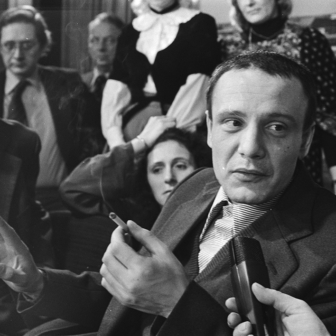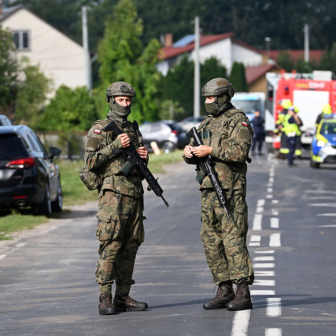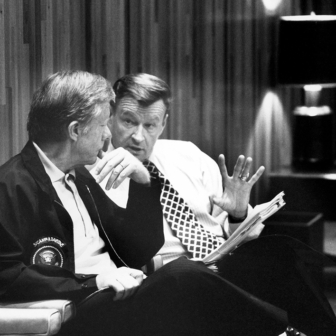SINCE the governing United Russia party’s setback at Russia’s parliamentary elections on 4 December, Vladimir Putin has been struggling to regain the initiative against a chaotic, hydra-headed opposition. With high energy prices sustaining the economy throughout his 2000–08 presidency, and buoyed by a bounce-back in prices since 2010, Putin’s luck seemed to be holding. His subordinate, President Dmitry Medvedev, was there to take the worst of the blame for Russia’s 8 per cent slump in 2009. Then, after a few ineffectual efforts to present himself as worthy of a second term, Medvedev meekly proposed Putin as the regime’s officially endorsed candidate at this Sunday’s presidential elections. Magnanimously, Putin responded by indicating that he would, in turn, appoint Medvedev as his prime minister.
But then came the shock rebuff at the elections for Russia’s parliament, the Duma. The result revealed a growing weariness among many Russians, particularly within the urban middle-class intelligentsia, at being taken for granted by their rulers. The job swap that Putin and Medvedev brazenly announced in September – quickly labelled “the castling” (rokirovka) by chess-playing Russian intellectuals – was rightly seen as a display of contempt for the voters. The prospect of Putin returning for up to two further terms of six years each suddenly struck many people as intolerable.
Even before December’s result there had been other shock developments, including, most spectacularly, the public booing of Putin at a martial arts contest a fortnight before the poll. For an extended period there had also been smaller rebellions staged by local citizens’ groups against the ever more pervasive scourge of official corruption. Yet Putin seemed ill-prepared for the electoral reverse. The regime’s initial reaction was to arrest and jail some of the participants at the large post-election protest against the rigging of the vote, which had been exposed more clearly than previously by internet sources.
Then, realising the strength of the protests, the authorities adopted more nuanced tactics, allowing a second and larger rally to proceed without hindrance on 10 December. A mini-thaw began to seep into public life, which in the following weeks started to resemble the early phases of Gorbachev’s glasnost and perestroika. Opposition figures banned for years from the state-controlled television made brief reappearances; liberals within the establishment spoke out in seemingly unscripted ways, calling for new budgetary priorities, greater “dialogue” and even the release of the jailed oligarch Mikhail Khodorkovsky, a sentiment likely to enrage Putin.
Though there was an element of manipulation in these reactions, the situation seemed to have become genuinely unpredictable. Senior politicians appeared to be repositioning themselves, and even expressing some personal opinions. Medvedev announced a set of proposed electoral reforms, including restoration of the direct election of regional governors and the removal of onerous restrictions on who is eligible to run for the presidency or the Duma. These changes would undermine key components of Putin’s system of “managed democracy,” but it quickly became clear that they were not to be brought into effect until after the presidential poll in March, and were thus years away. Putin also cast further doubt by suggesting that candidates could only run for governorships with the consent of the president. In such circumstances, excuses will be found for any concessions to be withdrawn.
Medvedev’s proposed reforms were seen as too little, too late by the protesters, who were demanding, among other things, a rerun of the Duma elections and the dismissal of Putin’s devoted ally, the Central Election Commission chairman Vladimir Churov. (Medvedev described Churov as “the magician” after he announced United Russia’s wafer-thin majority in the new Duma.) Despite the promises of future reforms, these opposition demands have not been met, and responsibility for securing a win for Putin in this weekend’s presidential poll still remains in Churov’s capable hands.
Even Vladislav Surkov, the puppetmaster and leading ideological phrase-maker in the Kremlin, emerged from the closet as a born-again liberal, for which he was soon demoted from deputy head of the presidential administration to the much less significant post of deputy prime minister in charge of “modernisation.”
But the most significant deviation from the party line came from Putin’s old friend, Alexei Kudrin, who was Russia’s finance minister and a deputy prime minister for many years. Kudrin had resigned from government after a public argument with Medvedev over planned budgetary expenditures, notably a huge build-up in military spending. In fact, his differences were probably more with Putin. Since Kudrin’s resignation, Putin has reaffirmed that he would like to see him back in a senior position, but also that he plans to greatly expand the defence budget. Kudrin, for his part, has tried to position himself between the authorities and the demonstrators. He has called for new elections in eighteen months (not immediately, like the opposition), attended the 24 December rally and addressed the crowd – to a mixed reception – and has offered to mediate wide-ranging discussions between the Kremlin and the street.
Most opposition leaders view Kudrin with respect, but there are suspicions that what he really wants is to return to power as prime minister. If Putin were to renege on his promise to appoint Medvedev and instead choose Kudrin, it isn’t clear that any major political liberalisation would follow, however. On budgetary matters, Kudrin would certainly be at least as determined a defender of fiscal good sense as he has always been as finance minister. But for that very reason, given his expansive plans for military expenditure, Putin may be reluctant to have him back.
OUTSIDE the Duma, the conditions for opposition forces have not been ideal. The Kremlin has systematically harassed them and worked to keep them fragmented. Although opposition leaders have contributed to their own ineffectiveness by their constant disputes, in recent months they have played down their differences and organised the big protest marches that have imparted such dramatic public visibility to the powerful currents of discontent increasingly evident in Russia’s cyberspace. The ostensibly oppositionist parties tolerated in parliament and public life are essentially parts of the Putinist system and can safely be ignored for most purposes. But they have performed a useful function for the real opposition since the leading rebel blogger, Alexei Navalny, popularised the tactic of calling on everyone to vote for anyone other than Putin. This worked well in the Duma elections, but may not be sufficient to force Putin to a second round this Sunday.
Since the high point of the 24 December demonstration, the opposition has sustained a certain loss of momentum. Anti-Putin sentiment is still very alive on the internet, often in forms that would be deeply wounding to any politician, much less an alpha-male autocrat like Putin. But it now seems likely that Putin will win and, at least as recorded by Churov, win well and in the first round. With temperatures falling below minus 20 and remaining there over an extended period, Generals January and February – traditional allies of Russian leaders – have contributed to deterring political ardour on the streets.
Sardonic attacks on Putin and his system have continued in cyberspace, but the opposition have not managed to devise any political formula to encapsulate their objectives. They have not put forward their own candidate for president (though had they sought to do so, would certainly have been blocked by the redoubtable Churov). The usual suspects from the three tame opposition parties are in the presidential race yet again, two of them – the communist leader Gennady Zyuganov and the populist court jester Vladimir Zhirinovsky – each running for the fourth time. The only candidate who looks slightly more interesting is the billionaire Mikhail Prokhorov, who has made some independent remarks but has been unable to fully convince the opposition that he is more than just a Kremlin project.
Meanwhile, the regime is engaged in visible preparations to get out the vote and rig it where necessary. Social security officials have revealed that they have been called on to collect as many votes as possible through “facilitated voting,” where officials help grateful pension recipients to cast their votes at home. Governors and military commanders understand that they will be held responsible for any poor outcomes in the election. And the Chechen tyrant Ramzan Kadyrov will no doubt be looking to improve on his 99 per cent result for the regime in the Duma elections.
Although he seemed a bit at a loss just after the Duma elections, Putin quickly regained his composure. In a series of statements and programmatic articles he has repeatedly evoked the spectres of internal subversion and external military threats, while promising generous budgetary support to all at considerable cost to Russia’s financial stability. Putin was also generous with other people’s money, publicly demanding Russian airlines offer free passage for Russian football fans to attend European Cup matches in Poland and Ukraine. One of the articles made a pitch to rekindle a kind of Soviet notion of Russian nationalism – one that ostensibly welcomes all those who speak Russian and see Russia as their home. While seemingly condemning Russian chauvinism as well as other shades, the article clearly sees Russians having pride of place – a pitch to xenophobia both internal and external, part dog-whistle, part explicit. As one legacy of their Soviet past, ordinary Russians already have a tendency to ethnic intolerance and jingoism, and opinion polls have detected an increase in these sentiments in the run-up to the presidential elections.
Increasingly, the regime is seeking to organise counterblasts to the opposition demonstrations. Groups of core constituents from factories, government agencies, provincial cities and Kremlin-controlled youth organisations have been bussed into demonstrations in support of Putin. And despite conciliatory noises emerging from the Kremlin, there has been a strong hint of artificially fanned class warfare, often promoted by Putin himself. In this narrative, the honest workers and ordinary citizens of Russia are pitted against the wealthy and pampered layabouts of Moscow and St Petersburg – people who seem to think that they are the creative classes, when it is the workers who built a giant dam or a new railway line who are truly creative. According to this view, the spoilt rich of the capitals are traitors who are quite prepared to sell out their country for a few pieces of silver offered by the CIA et cetera.
These are somewhat shop-soiled methods and storylines, however. While they still work up to a point, the air of fatalistic acceptance at pro-Putin gatherings contrasts sharply with the unmistakable exuberance of the opposition crowds. Participants in the Putin rallies have often told journalists quite openly that they are only there because they were pressured or bribed. And Putin has continued to feel uncomfortable about public appearances, keenly aware, it would seem, that his once genuinely strong popularity has largely evaporated. On the relatively few occasions he has addressed the mass rallies organised on his behalf, he has looked less confident than he once did. Still, it may all be enough to get him over the line.
PUTIN’s autocratic rule has been relatively consensual to date, and neither gratuitously violent nor ideologically rigid. Compared to Alexander Lukashenko’s Belarus, for example, it has been a haven of pluralism. But that may be about to change. Putin has been reluctant to suppress opposition activities or go after their leaders too aggressively during the trimester between the elections for fear of provoking a backlash. Once he is safely ensconced back in the presidency, he may well remove the gloves. Already there have been some ominous signs that the phoney war is about to end. Some of the key opposition media outlets have been subjected to various forms of attack, either directly via the compliant law and justice system, or through pressure on owners already known for their responsiveness to Kremlin requirements.
The celebrated Moscow radio station Ekho Moskvy (Echo of Moscow), one of the very few independent non-print outlets with any reach (currently over a million listeners daily), has recently come under pressure from its two-thirds owners, Gazprom-Media. As the name suggests, this is an offshoot of the huge parastatal company that is a willing executor of Moscow’s “energy diplomacy,” frequently making decisions of dubious economic rationality that happen to serve the Kremlin’s strategic interests. Putin has usually taken a semi-tolerant approach to the station, but in a meeting with media figures a few weeks back he angrily reproached its editor-in-chief, Alexei Venediktov, for retailing rubbish from morning till night and “pouring shit all over me.” Now Gazprom is moving to reshape the station’s board, which Venediktov has described as an attempt to reshape its editorial policy.
There have been other such attacks. Novaya Gazeta (New Gazette), the leading independent newspaper, has lost four of its bravest and most eminent journalists, including Anna Politkovskaya, to murder, typically by unidentified assailants. Now the Central Bank, no less, is conducting an investigation into the business affairs of its part-owner, the controversial but seemingly independent oligarch and ex-KGB officer Alexander Lebedev (Mikhail Gorbachev is also a part-owner); last week, as a result, Novaya Gazeta was reportedly unable to pay its staff’s salaries.
Some of Putin’s key personnel decisions in recent weeks also point to a looming policy adjustment. The extravagantly anti-Western ex-ambassador to NATO, Dmitry Rogozin, has been appointed deputy prime minister responsible for defence, and the reputedly hardline Vyacheslav Volodin has been elevated into the vacancy left by Surkov in the presidential administration. Putin’s rhetoric against opposition members – whom he has repeatedly labelled national traitors in foreign pay – has been consistently venomous through the election period. While the charges would be ridiculous if they were not so ominous, his anger is not simulated. If and when he feels he can deal with this dangerous threat to Russia’s sovereignty and, coincidentally, to his own political survival, he may well take severe measures.
His relatively benign treatment of most Russians has not extended to all his subjects. He came to power and popularity fuelled not just by oil and gas price surges but also by a brutal war against the Chechen rebels, a war which is still not over and which has increasingly become a jihadist insurgency as it has spread to neighbouring Muslim-populated regions. That war was partly justified by a sudden spate of mysterious apartment bombings in Russia in 1999, when Putin was prime minister. Doubts have been expressed about the attribution of blame for these atrocities to terrorist organisations, and some of those who raised such doubts have subsequently been assassinated.
And now we have this week’s remarkably well-timed official reports of an assassination plot against Putin himself, in which Caucasian terrorists (one with reported British connections) have been found to be implicated. The bruised and bleeding body of one of the arrested men has already been displayed on TV, leaving little doubt as to what their judicial futures will be. In the meantime, they may have a variety of instructive roles to play. For the moment their arrest is clearly meant to boost Putin’s election result.
It is noteworthy that these culprits were nabbed with the assistance of security forces from Ukraine, where that well-known Europhile, President Viktor Yanukovych, recently appointed two ethnic Russians with strong Soviet Russian (and in one case KGB connections) to head the key ministries of defence and internal security. Perhaps this valuable cooperation will improve the troubled bilateral relationship and, who knows, it may even help get Yanukovych a desperately needed gas price discount.
None of this necessarily means that Putin is preparing to declare a state of emergency or anything of the sort, though such a development at some point can’t entirely be ruled out. Barring a steep economic downturn or some other event that sharply elevates domestic tensions, however, it seems much more likely that we will see incremental repressive steps to restrict the internet, immobilise the main centres of opposition and sever the protesters’ links to the broader population.
PUTIN has been politically damaged by the recent outburst of popular resistance, and by the withering mockery to which he has been subjected in Russia’s cyberspace. He is coming under some pressure even from hitherto loyal business circles, and possibly other quarters in the elite, to consider declaring his intention not to seek a further six-year term in 2018. It may be that popular resentment and resistance will continue to mount even if, or indeed perhaps because, he unleashes a crackdown against his tormentors. According to one recent line of argument, Putin’s “power vertical” – his centralised control over all parts of the Russian establishment – was always a mirage, and he is really no more than a chairman-like figure, precariously balanced over a whirlpool of conflicting silovik and oligarch groupings all of them pursuing separate corrupt interests and largely out of his control.
It is certainly true that Putin’s position has been damaged, and also that any autocratic power structure is likely to have a latent brittleness that can precipitate an abrupt collapse if habits of obedience and compliance are suddenly punctured. But there is quite a gap dividing potential brittleness from hapless impotence. It still seems likely that Putin retains the confidence of the military and security establishments, even if the doubts of some of its denizens about this or that may be growing. He hasn’t recently given them all a massive pay increase for nothing. If we are seeing the beginning of the end of Putin’s reign, it may take quite some time yet to run its course.
We will probably get some pointers to some of the key imponderables quite soon. If Putin appoints Medvedev prime minister, as promised, or if the apparent coolness between them in recent months means that deputy prime minister Igor Shuvalov or former deputy PM Kudrin gets the job, we might expect the more moderate elements in the elite to have continued influence. But if there were a surprise appointment, now or in a few months, of someone like Volodin or the Moscow mayor Sergei Sobyanin, we could see a more self-willed and hardline Putin, unconstrained by liberal reformers in his midst.
What will he do to curb the internet? He doesn’t use it much or have a good understanding of it, but he has recently been made painfully aware of what it can do to him. His past assurances about internet freedom were never credible, given the regime’s regular deployment of computer hackers to advance government policies domestically as well as externally.
Will he continue his sharply anti-Western rhetoric of recent months? It’s all vintage Putin, but how will it affect his actual relations with the West in the years ahead? Will he further strengthen his “strategic partnership” with China in order to make the world safe for the Assads and their like and to finally expunge the ugly threat of coloured revolutions from the post-Soviet scene?
Or will we see, as some have argued, a more relaxed and confident Putin, prepared to seek economic and other reforms and dialogue and reconciliation with the opposition and the West? We shouldn’t have too long to wait. •




